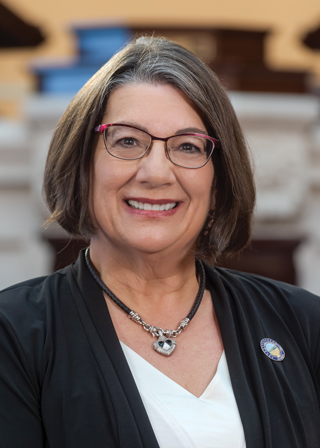As published in Toledo Business Journal - May 1, 2019
Ohio bill limiting discrimination receives first hearing
Legislation with support from many Ohio businesses that would prohibit discrimination on the basis of sexual orientation, introduced in the current session of the Ohio Senate, received its first hearing before an Ohio Senate committee in mid-March. The hearing before the Senate Judiciary committee for Senate Bill 11 (SB11), called the Ohio Fairness Act, addresses issues aimed at updating the State’s anti-discrimination laws to add protections for employment, housing, and public-accommodations for members of the LGBTQ community. In Ohio, individuals can be denied housing, employment, or other services based on sexual orientation or expression of gender and there are no consequences to employers, landlords, or businesses that are involved.

Ohio Senator Nickie Antonio
The Senate legislation was introduced by Senator Nickie Antonio, a Democrat from Lakewood, the legislature’s only openly gay member. Antonio has introduced similar legislation on three previous occasions with no success in the Republican-controlled Ohio Senate.
There are a number of things that have changed in Ohio including new support for the current legislation from some conservative sectors.
DeWine Executive Order
In January, Republican Governor Mike DeWine issued Executive Order 2019-05D that protects all State employees from workplace discrimination:
“Whereas, the State of Ohio seeks to attract, maintain, and retain the best, most talented, and most dedicated public employees to be the best and most efficient public servants to the citizens of Ohio and for these public employees to stay and raise their families in this State;
“Whereas, Article XV, Section 10 of the Ohio Constitution has long required that appointments and promotions in the civil service of this State be made according to merit and fitness; and
“Whereas, it shall be the policy of my Administration to prohibit unlawful and inappropriate discriminatory employment practices in State government and to ensure that all State government employees have employment opportunities based upon their talent, skill, dedication, merit, and fitness for the job.”

Ohio Governor Mike DeWine
“I am delighted by Governor DeWine’s executive order, which adds sexual orientation and gender identity or expression to protected classes and creates a model of workplace policy that respects and protects all of our State employees,” said Antonio. “This is truly the right thing to do.”
“… Both the protections for the LGBT community and parents are encouraging. This is a family-friendly employment policy,” said Antonio. “I firmly believe that this anti-discrimination policy should serve as a model for all employers in the state of Ohio.”
Ohio Chamber support
The legislation has gained significant support from the business community in Ohio. During 2018, a committee hearing was held in the Ohio House for legislation similar to the current SB11 bill, called at that time House Bill 160 (HB160). It has not yet been reintroduced in the current House session. The House Government Accountability and Oversight Committee heard testimony last year, during an HB160 hearing, from Don Boyd, the director of Labor and Legal Affairs for the Ohio Chamber of Commerce.
“Our goal is to make sure Ohio is not at a disadvantage in the recruitment, attraction, and retention of top talent and investment. In order to compete, Ohio businesses need the best and brightest talent from all walks of life to feel welcome and to call Ohio home. Ensuring that Ohio’s future business competitiveness is good for all of Ohio and enhances respect for all employers and employees is key. These protections will further show that Ohio is a hospitable and welcoming place to live, work, and start a business,” explained Boyd.
“In advancing Ohio’s business climate, the Ohio Chamber recognizes the value and power of diversity. We believe that employees deserve robust protections from discrimination and that discrimination of any type has no place in the workplace. Everyone deserves the right to do their job without fear of being discriminated against and every person, regardless of their race, color, religion, sex, military status, national origin, disability, age, ancestry, sexual orientation, or gender identity, deserves equal opportunity and equal protection under the law.
“Twenty-one states and the District of Columbia currently have laws on the books outlawing discrimination based on sexual orientation and/or gender identity. Further, 19 municipalities in Ohio currently have similar anti-discrimination laws on the books including Akron, Athens, Bexley, Bowling Green, Cincinnati, Cleveland, Cleveland Heights, Columbus, Coshocton, Dayton, East Cleveland, Lakewood, Kent, Newark, Olmsted Falls, Oxford, Toledo, Yellow Springs, and Youngstown. As with other areas of labor and employment law, a patchwork of local labor ordinances can create a compliance nightmare for Ohio’s employers. HB 160 would provide a uniform statewide anti-discrimination standard and process for Ohio’s businesses and workers. This is consistent with our position on many other issues and would allow for simpler compliance and knowledge of the law,” Boyd stated.
Case law
A Supreme Court case decided in June 2018 provides possible insight into the constitutionality of the legislation before the Ohio House and Senate. In Masterpiece Cakeshop, Ltd. v. Colorado Civil Rights Commission, the court held that “… The laws and the Constitution can, and in some instances must, protect gay persons and gay couples in the exercise of their civil rights, but religious and philosophical objections to gay marriage are protected views and in some instances protected forms of expression. (See Obergefell v. Hodges, 576 U. S. (2015).)
Further, according to Equality Ohio, while recognizing that religious faiths and practices are protected under the Free Exercise Clause, the Court reaffirmed the general rule established in Newman v. Piggie Park Enterprises (1968), among others, that “such (religious or conscience-based) objections do not allow business owners and other actors in the economy and in society to deny protected persons equal access to goods and services under a neutral and generally applicable public accommodation law.”
Support in NW Ohio
The primary vehicle for businesses to express their support for LGBTQ-inclusive nondiscrimination policy in Ohio is at a website called Ohio Business Competes. Some of the businesses and entities found on the list at this site with operations in northwest Ohio include BP Husky, Whirlpool, Fifth Third Bank, Campbell Soup, Cooper Tire & Rubber Company, BGSU, MetriKs Amerique LLC, CageDesign LLC, Lima/Allen County Chamber of Commerce, Lima Memorial Health System, Lima Pallet Company, Inc., R.M. Schulte & Associates, and Wannemacher Total Logistics.
Toledo Business Journal addressed this issue of discrimination in Ohio with Tim Brown, former member of the Ohio House of Representatives and current president of Toledo Metropolitan Area Council of Governments (TMACOG).

Tim Brown, president of TMACOG
“Presently in Ohio it is fully permissible under Ohio law to fire someone based on their sexual orientation or gender identity. Those same individuals can also be legally evicted from where they live because of their status as LBGTQ. … There is not a business anywhere in Ohio that isn’t clamoring for more workers. Our state has a workforce shortage. Yet many people leave Ohio or will not come to Ohio to live and work because they can be legally discriminated against,” explained Brown.
“Many businesses in Ohio that have workplace policies that prohibit discrimination still cannot attract some workers to Ohio because their employee’s partners or spouses can be discriminated against or evicted. Our State needs all the tools in the tool box we can get to attract and keep a well-trained and diverse workforce. We need an Ohio that is welcoming to everyone – it is fundamentally the right thing to do from a humanitarian standpoint and a position of economic competitiveness. We need our area legislators to announce support for SB11 and ask their leadership for an opportunity to vote for the bill. I also encourage area businesses that are supportive to please go to the website (Ohio Business Competes) and add their names to the list,” Brown concluded.
